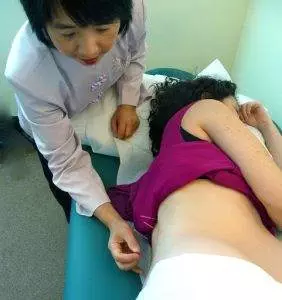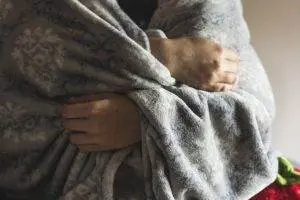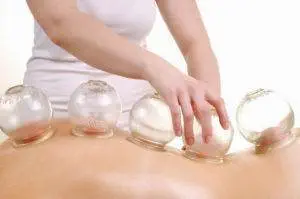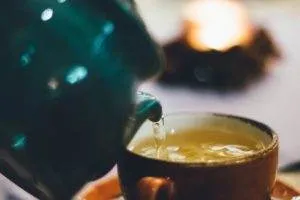Whether you are looking for a natural alternative or want to increase your chances of success by combining acupuncture with other ART (Assisted Reproductive Technologies), TCM provides comprehensive, effective treatment.
Infertility Treatment with Acupuncture and TCM
Infertility treatment with acupuncture and Traditional Chinese Medicine (TCM) dates back for thousands of years. Infertility is a common condition, affecting about one in ten couples who want to conceive. Approximately 40% of cases are due to problems on the woman’s side, 40% to problems on the man’s side, and 20% are unexplained.
TCM infertility treatment includes the use of several modalities, including:
- Acupuncture

Dr. Cai Infertility Treatment - Herbal supplements
- Moxibustion
- Cupping
- Nutrition and lifestyle guidance
Dr. Cai of Art of Wellness in Santa Monica, Los Angeles, CA is an expert in women’s health and infertility in women with over thirty years of experience. She has helped hundreds of couples fulfill their dream of bringing a healthy baby into the world. In China, Dr. Cai worked with pioneering doctors on the forefront of integrating Traditional Chinese Medicine (TCM) methods with cutting-edge gynecological and infertility treatments. Since bringing her practice to Los Angeles in 1997, she has worked in concert with the top medical professionals in the field to help improve outcomes for couples who choose this integrative concept.
Infertility in Women
Modern women are now able to choose many paths in life. The journey towards motherhood has evolved. When a woman is ready to create her family, she may need to seek extra support. TCM brings a traditional and time-tested approach to a process that can be daunting at times. Establishing a trusting relationship with an acupuncture practitioner can help a woman feel empowered to better understand her cycles, her relationship to her body, and ultimately, to move into the experience of pregnancy and mothering with confidence and vitality.
Infertility treatment means taking care of the whole woman. A TCM practitioner looks at every aspect of the constitution, history, lifestyle and emotional world of each patient. Many different conditions can contribute to infertility, directly or indirectly, including:
- Irregular and/or painful periods
- PCOS (polycystic ovarian syndrome)
- Low AMH levels (anti-müllerian hormone)
- High FSH
- Endometriosis
- Autoimmune issues/multiple miscarriage
- Stress/anxiety
- Uterine Fibroids
TCM treatments for infertility in women begins with addressing any underlying health problems. It is tremendously helpful to start working with your acupuncturist at least a few months (menstrual cycles) before beginning an ART cycle. In some cases, women conceive naturally during this time, their issues resolved through TCM alone. It can take 2-3 months for the treatment to regulate hormone imbalances and improve egg and uterine lining quality.
How To Treat Infertility with Acupuncture
The combination of acupuncture and supplementation with personalized herbal formulation increases a patient’s chances of conceiving by harmonizing all of the reproductive organs and systems synergistically. Recent studies have concluded that acupuncture helps to:
- Regulate menstrual cycle
- Increase blood flow to the uterus, which improves the chances of implantation
- Normalize hormone and endocrine systems that regulate ovulation
- Positively affect the hypothalamic-pituitary-ovarian axis
- Reduce anxiety and stress
- Reduce the side effects and pain associated with ART hormone medications and procedures
Acupuncture operates on the premise that most health issues are caused by an imbalance of Qi (life force energy) and blood, affecting the healthy functioning of one or more of the organ systems. When Qi and blood are circulating freely throughout the body, every cell, tissue and organ is properly nourished and can function well. Acupuncture and TCM can raise the fertility potential of women by positively affecting the quality, quantity, balance and flow of Qi and blood.
For more detailed information about how TCM practitioners diagnose and differentiate different causes of infertility in women, visit our article here.
Infertility in Men
Problems with sperm quality are becoming increasingly common. Most men are not aware, though, that there is a problem until they are trying to have a baby.
Causes of male infertility often involve the existence of a condition that creates too much heat in the body. Sperm cannot survive at high temperatures. Stagnation of blood and qi in the reproductive organs can create blockages and increase heat. Sometimes a history of infection, either with an STI (sexually transmitted infection) or UTI (urinary tract infection), has caused damage to the organs. There can be hormonal imbalances, too, that cause semen to be coagulated, too thick for the sperm to move effectively.
In TCM, we differentiate male infertility according to our philosophy of organ systems:
- Kidney deficiency – can mean that there is some constitutional weakness going to back to early development. Onset of puberty may have been later in teenage years. The testes may not have developed or descended fully.
- Dampness/Excess Heat – indicated by a past or latent infection. What we call jiao, or the lowest of the “three burners” in the body, does not function properly, creating too much dampness and heat in the pelvic floor area, compromising sperm formation and travel.
- Toxic exposure/Stress and Anxiety – can lead to stagnation. The sperm does not have enough vitality to move.
Acupuncture and herbal supplementation combined with some lifestyle and dietary adjustments can dramatically strengthen the quality, quantity and motility of sperm. It can also help with ED (erectile dysfunction). Avoiding hot baths and soaking in jacuzzi is important. We also recommend that men do not carry their cell phones in their front pocket; if you must, put it in your back pocket, away from the groin area. Above all, keep in mind that men also need holistic care that helps them approach the family-making and parenting process in optimal health.
Continuing acupuncture treatment during pregnancy and the post-partum period is beneficial for mother and baby, as it is effective for a host of related issues, including nausea and vomiting, back and hip pain, management of blood sugar levels, as well as reducing pain during labor and helping to encourage an abundant supply of breast milk.
Building a team of trusted professionals to support you can make all the difference in both your experience of the process and the success of the outcome. We hope you will schedule a visit for an initial consultation with Dr. Cai so you can get started creating optimal health for yourself and your growing family.
For additional resources, visit our Fertility FAQs page and our related article. For more examples, visit our success stories of women who found solutions from Dr. Cai’s treatment.



